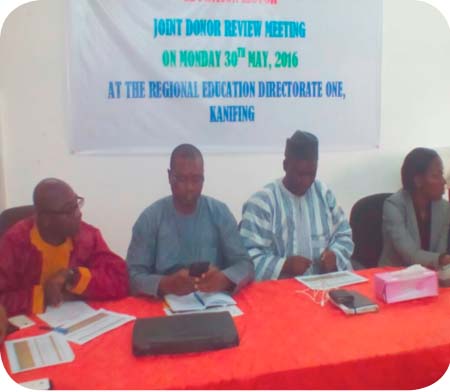
The meeting included, among others, consultations and dialogue on sector policy issues, sector plans, field trips to project sites/schools covering Basic and Secondary Education, as well as Higher Education, Research, Science and Technology.
The objective is to ensure that the entire education sector plans (strategy, medium term and policy) are successfully implemented, within the framework of the Paris Declaration and the Accra Agenda for Action.
It also seeks to aid alignment with national development agenda and priorities, improved coordination, managing for results and mutual accountability for better results for the education sector.
In his opening remarks, the permanent secretary at the Ministry of Higher Education Research, Science and Technology, Dr Cherno Omar Barry, said that at the level of MoHERST a lot of things had been going on over the years.
He said since Technical Vocational Training is a cross cutting issue for both MoBSE and MoHERST, the two ministries had been collaborating closely together to ensure that they look at the diverse issues that relate to TVET.
“We are conscious of the number of high un-skilled youths, but the challenge is still confronting on the mind set of people towards TVET since most parents will prefer to see their children to go to the university rather than TVET training school, because they see people going for skills are those who have no option to succeed in life.”
He said there are lots of testimonies being made that TVET education is becoming much more attractive than the academic sector.
The academic sector, he said, is soon going to encounter so many challenges because of the high number of graduates every year, but for TVET they could be self-employed, autonomous and self-reliant.
Rupert James Leigthton, UNICEF deputy representative, said he was proud to state that the government had made “tremendous achievements” in the education section, particularly in Early Child Development (ECD).
He said, recently, they have seen significant progress in enrolment at ECDs.
“The other important thing to mention is the revitalisation of TVET education training programme,” he said, adding that government must be commended for this achievement, but “significant challenges do remain”, he added.
He said in recent years many African youths, including Gambians are embarking on risky journeys to Europe (back way).
He said the upcoming government’s PAGE needs to prioritise investment in technical and vocational education.
Ms Josephine Lutta Kiyenge of Global Partnership for Education Country Lead said she had previously worked with The Gambia education sector.
She expressed her appreciation on the leadership and priority of the ministry in focusing on quality education.
Other speakers on the occasion included Ms Ryoko Tomita of World Bank, and the deputy permanent secretary Ministry of Finance, Lamin Camara.
The ceremony was chaired by Baboucarr Bouye, permanent secretary at MoBSE.



